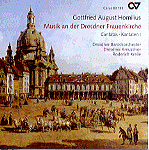At the end of my earlier review of motets by Gottfried Homilius, performed by the Stuttgart Chamber Choir and recorded on Carus (type Q8392 in Search Reviews), I suggested that listeners demand more recordings from Carus of works by this virtually neglected 18th-century master–and voilà!, like magic another Homilius program turns up, this time featuring four cantatas, expertly performed by the Dresdner Kreuzchor and Dresden Baroque Orchestra. Like its predecessor, this disc also features world-premiere recordings, and although its title confirms that these works originally were composed for Dresden’s famous Frauenkirche, and reference is made in the liner notes regarding the recent completion of the church’s restoration following its destruction at the end of World War II, the recordings were made in the same city’s Lukaskirche, which proves a fine venue if not ideally satisfying for purposes of historical completeness.
Nevertheless, this choir–whose ancestry reaches back more than 700 years–delivers dynamic performances characterized by carefully balanced, articulate ensemble and vibrant tone, thanks in large part to a cadre of sensational boy trebles. My only complaint about the performances concerns the female soloists, whose recitatives in particular are square and stilted and devoid of expressive character. (Was the conductor responsible for this, or were the singers?) Alto Anne Buter also is inconsistent, labored in some places and freely confident in others (especially in the exciting aria “Gebückt verehren dich die Seraphinen”). On the plus side, tenor Hubert Nettinger is magnificent.
As for the music, if you were to jump in at the beginning of Selig seid ihr, you’d think you had stumbled on a long-lost Bach cantata, with its gorgeous oboe duet and following elegant, graceful vocal lines from soloists and chorus. On the other hand, Heilig ist unser Gott is squarely ensconced in a later, early-Classical style, as is Gott fähret auf mit Jauchzen. So there’s intriguing variety, always marked with a consistently refined, high-order craftsmanship in the service of genuinely original, creatively organized ideas. Homilius shows himself exceptionally skilled at creating substantial, very well-developed and melodically sophisticated arias, and “Geduldig beuge deinen Rücken”, the tenor aria in Selig seid ihr, has to rank as one of the finest in the genre–and the one for alto in Gott fähret auf mit Jauchzen perfectly conveys its text’s joyful, celebratory mood with buoyant rhythms, lively orchestral accompaniment (including appropriate interjections by horns), and a busy, dancing melody. This is a superb effort all around (with the above-mentioned reservations), and if you enjoyed the earlier motet disc, you’ll be certain to appreciate this one as well. If you aren’t familiar with this unjustly ignored composer, and especially if you like Bach, you should get to know his music without delay. You won’t go wrong by starting here–and maybe if we send a few more emails to Carus, they’ll favor us with yet another Homilius gem. [3/18/2005]
































